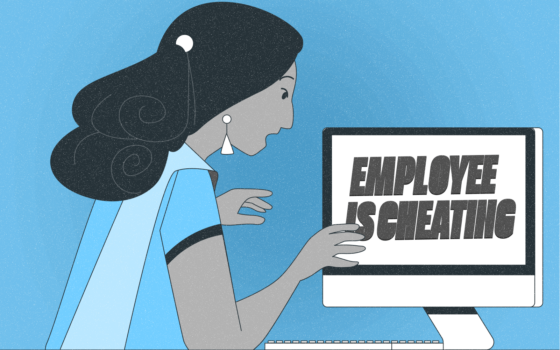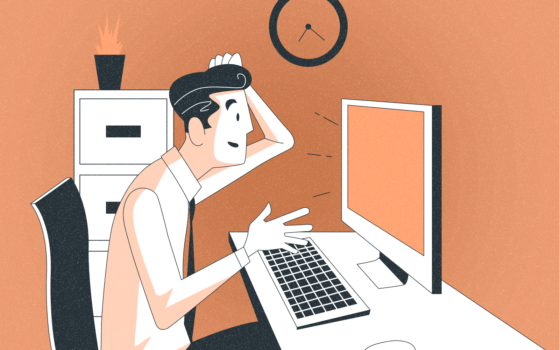The Skills for Collaboration: What You Need to Know About Working Effectively as a Team
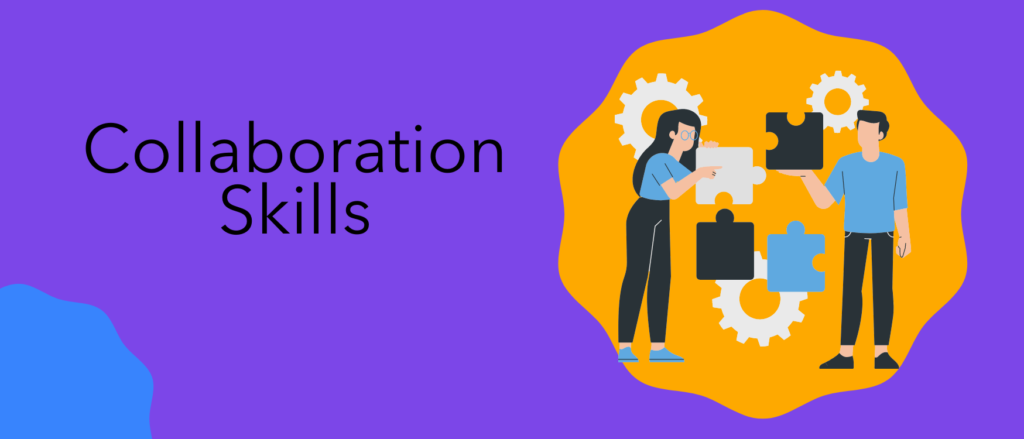
When it comes to working together, we could think it’s all about delegating tasks and letting people be, right? Yet, this premise is far from the truth! Effective collaboration allows for different points of view and interpersonal skills to be brought together to reach a common goal.
Therefore, to build a collaborative environment, you need to develop collaboration skills; this is exactly why we are here! In this blog post, we will discuss what those skills are and how you can successfully develop them. Stay tuned!
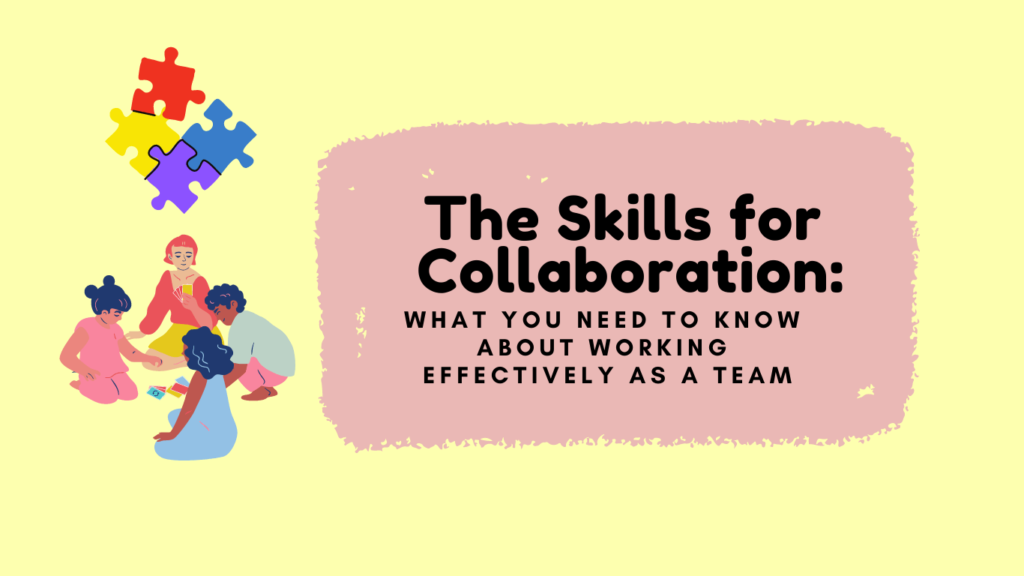
It may sound repetitive to talk about “collaboration” After all, we are in the 21st-century, a time we know everything about everything. And it’s precisely due to this “know-it-all” state that we need to further define the ever-changing 21st-century skills.
According to Dillenbourg, 1999 and Hunter, 2006 collaboration is a skill that “promotes the use of learning methods like induction, deduction, and associative learning.” On the other hand, Lai 2011 defines collaboration as “the combined participation of individuals in a concerted effort to solve a problem.”
This last definition sounds like the perfect element mix for workplace collaboration. Still, it also can sound like the definition of teamwork which pops up the question: Is teamwork the same as collaboration?
Teamwork Vs. Collaboration
That would be a NO! The terms collaboration and teamwork are often used interchangeably, but they are not the same!
Teamwork is a group of people with complementary skills who work together to achieve a common goal. The main characteristic of working in teams is that each member works independently on their assigned task but knows that the team’s success depends on everyone completing their tasks.
On the other hand, collaboration occurs when staff members share knowledge and ideas to create a joint product or solve a problem. Collaboration requires trust, communication, and respect from every team member.
Collaboration is more than just working together. It’s working together for a common purpose while respecting each other’s ideas and opinions.

Now that we settled that difference, let’s dive into the topic!
What Are Collaboration Skills?
Collaboration skills are the capacity to work effectively with other staff members to achieve a common goal. This involves soft skills such as communication skills, problem-solving, and team-building. The best collaboration skills are essential in any collaborative environment, as they allow for more efficient and effective work.
Collaborative skills are not individual skills but rather groups of different soft skills which enable collaboration and teamwork
These effective collaboration skills include but are not limited to:
- Communication
- Active listening
- Conflict resolution
- Creative thinking
- Emotional intelligence
Get more out of your business
Get the best employee engagement content every week via mailing list
The Benefits of Collaboration
If we tell you Toy Story and Monsters Inc. is the peak example of collaboration, will you believe us? We are not lying and Steve Jobs is behind it! This genius was famous for redesigning Pixar’s office with collaboration in mind.
After Jobs joined the company, he got rid of all the cubicles and created an open office space where employees from different departments could interact with each other.
This collaboration led to some of the most successful animated films ever made! This is truly the graphic definition of infinity and beyond!
In numbers, successful collaboration can lead to some great outcomes. According to Frost & Sullivan’s data, a company’s cooperation index raises revenues by 27% and enhances customer satisfaction ratings by 41%.
As well, collaboration increases product quality by 34% and enhances product development by 30%.

Yes, collaboration can lead to some pretty impressive results! Here are some benefits of collaboration:
Increased Creativity and Innovation
Cooperative learning has been shown to increase creativity and innovation. When staff members are working together towards a common goal, they can share ideas and build on each other’s thoughts to come up with new and better ideas.
Good collaboration allows for different stances and ideas to be brought together, leading to more creative solutions.
Improved Communication
Improved communication through collaboration skills helps to better equip professionals with the collaboration tool they need to succeed. Through improved communication, individuals learn how to share ideas, thoughts, and emotions more effectively with others more effectively.
Greater Efficiency
Whilst collaboration can sometimes slow down the work process, as staff members have to communicate and coordinate with each other, it can also lead to greater efficiency in the long run.
This is because collaboration can help avoid mistakes, as staff members can catch errors others might have missed.
Enhanced Learning Opportunities
Collaboration provides enhanced learning opportunities as team members can learn from each other. This is especially beneficial for those who are new to the team or the task at hand, as they can learn from more experienced staff members.
Improved Problem-Solving
Collaboration brings different perspectives and ideas together, leading to improved problem-solving.
This is because collaboration allows staff members to brainstorm and come up with creative solutions they may not have thought of on their own.
Improved Social Skills
Working collaboratively can help improve social skills such as working in teams, leadership, and communication.
No matter if collaboration is a skill itself or has some “sub-skills” The important issue here is to identify them and learn how to improve your collaboration skills. Let’s take a closer look at each collaborative skill and how you can grow them!
The Skills for Collaboration
Completing a task alone can be satisfying, but it’s often more rewarding to complete a task as part of a team. Working collaboratively has many benefits, including increased creativity, improved communication, and enhanced learning opportunities.
Yet, what exactly are the skills for collaboration?
Here are some collaboration skills that will help you work effectively as part of a team:
Active Listening
Active listening is a collaborative skill that involves paying attention to the speaker, understanding the message they are trying to communicate, and providing constructive feedback.
It is important to practice this skill to ensure that everyone on the team is on the same page and understands what needs to be done.
HOW TO: To enhance this skill, try practicing the Socratic Questioning technique. This involves asking questions that help to clarify the speaker’s message and ensure that you understand what they are trying to say.
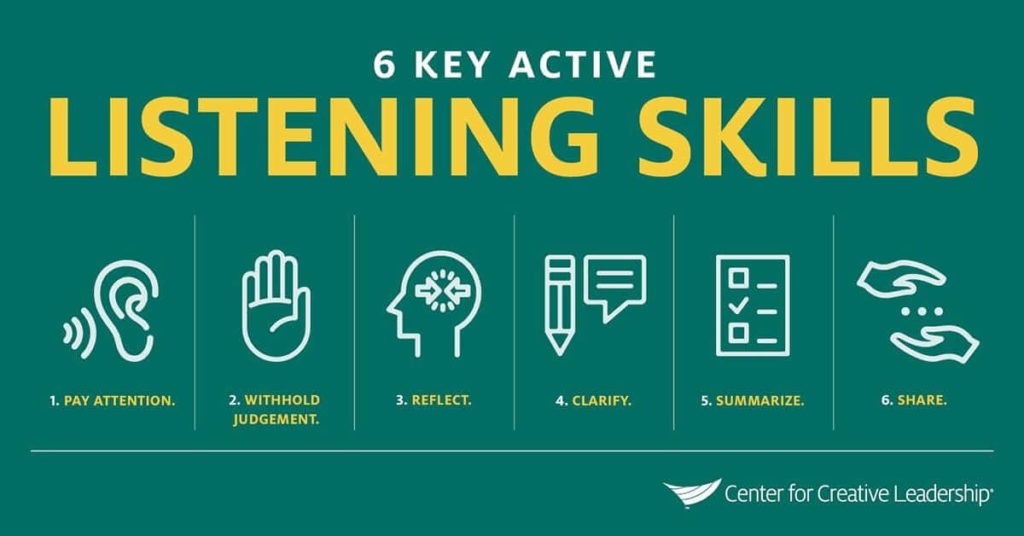
Communication Skills
The capacity to communicate effectively is essential to facilitate collaboration. This collaboration skill involves being able to share information and ideas clearly, as well as listen to others.
It is important to remember that effective communication goes both ways – you should be able to both share your ideas and listen to the ideas of your colleagues.HOW TO: The best way to improve your communication skills is to practice, practice, and practice! Try to find opportunities to communicate with others, whether in the traditional office or with your virtual team. Pay attention to how you communicate and see if there are any areas you can improve.

There are two types of communication: verbal and nonverbal.
- Verbal communication: Good verbal communication requires both active listening and clear speaking. This type of listening means paying attention to what others are saying and trying to understand their point of view. It also involves being open to new ideas and perspectives.
- Nonverbal communication: Nonverbal communication is an essential component of collaboration skills. It includes body language, facial expressions, and vocal intonation. Nonverbal communication can be used to establish rapport, trust, and cooperation. It can also be used to monitor and manage emotions.
Emotional Intelligence (EQ)
Emotional intelligence, or EQ, is vital for success in the modern workplace. Individuals with high EQ can navigate difficult conversations, manage conflict effectively, and build strong relationships with their coworkers.
Emotional intelligence is the capacity to be aware and understand emotions and to use this information to guide thoughts and actions.
As a result, they are better able to collaborate on projects and produce high-quality work. While IQ is still important, it is clear that EQ has become increasingly essential for those looking to succeed in the professional world.

Leadership Skills
Leadership skills involve being able to motivate others, set goals, and delegate tasks. If you are working on a project with a team, it is important to take charge and provide direction.
HOW TO: One way to improve your leadership skills is to take on additional responsibilities at work or in your community. This will allow you to put your collaboration skills into practice and learn more about what it takes to be an effective leader.
If you visit our blog often, you will remember when we wrote about leadership skills and how to grow them (If you don’t, you can read the post here)
Flexibility/Adaptability
Flexibility and adaptability are key collaboration skills. The ability to adjust one’s approach in response to the needs of the situation is essential for effective team working.
When team members are flexible and adaptable, it helps the team to be more effective as a whole.
Flexible staff members can roll with the punches, so to speak, and adapt their behavior as needed. This can be a challenge, as it requires good situational awareness and self-awareness. However, it is a crucial skill for successful collaboration.
HOW TO: First, it is important to be aware of different communication styles and to be able to adjust one’s own style as needed. Second, it is helpful to be able to see both the big picture and the details of a situation. Finally, it is important to be able to build relationships with others, even those with whom one disagrees.
Organizational Skills
The ability to stay organized is important for collaboration. This collaboration skill involves being able to keep track of deadlines, tasks, and meetings, and it also means being able to manage multiple projects simultaneously. HOW TO: One way to improve your organizational skills is to create a system that works for you. It may involve using a planner, setting reminders, or keeping a list of tasks to be completed. Another way to improve your organizational skills is to ask for help from others. This could involve asking a coworker to help you keep track of deadlines or asking your boss for clarification on an assignment.

Conflict Resolution
Conflict is inevitable, but it doesn’t have to be a bad thing. By definition, conflict resolution is the process of resolving disputes between two or more parties. Some common strategies include mediation, arbitration, and negotiation.
This process involves both parties coming together with a neutral third party to discuss the disagreement and find a solution that works for everyone.
While conflict can often be seen as negative, it can also be an opportunity for growth and creativity
HOW TO: One way to enhance your conflict resolution skills is to practice active listening. This means paying attention to what the other person is saying and trying to understand their point of view. It also involves being open to new ideas and perspectives.
Empathy
Empathy is the ability to understand and share the feelings of another person. It is a crucial collaboration skill as it can help team members to better understand each other and work together more effectively.
This skill allows you to understand what others are saying and to respond accordingly. It also shows that you value what others have to say.
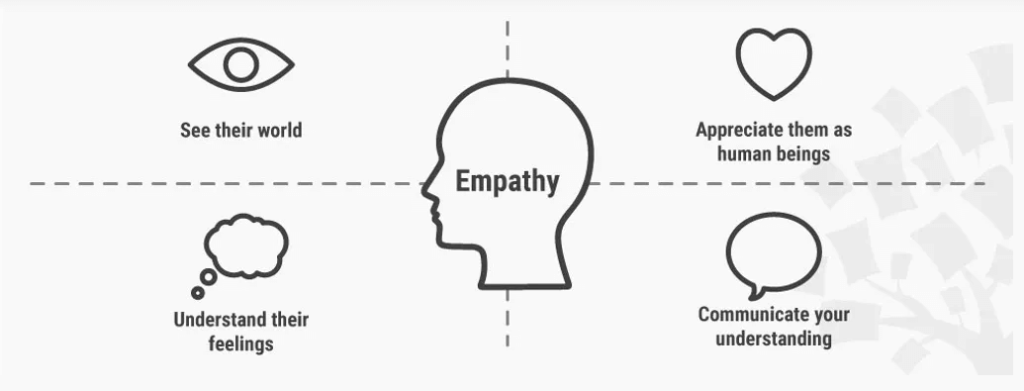
Critical Thinking
The ability to think critically is a vital collaboration skill. This means being able to analyze a situation and make judgments about what is the best course of action. It also involves being able to see both sides of an issue and come up with creative solutions. HOW TO: One way to develop your critical thinking skills is to practice problem-solving. This could involve working on puzzles or brainteasers, brainstorming different solutions to a problem, or taking on new challenges at work. Another way to improve your critical thinking skills is to ask questions. This could involve asking for clarification from others or doing additional research on a topic.

Project Management Tools
Yes, collaboration often needs the handy tool of tech! These tools help you keep track of deadlines, tasks, and meetings. They also allow you to share files and communicate with other team members. Some common tools for project management include Slack, Microsoft Teams, Basecamp, and Monitask.

Long-term thinking
One interesting thing about collaboration skills is they are not only about the here and now but also about the long-term scenario. This means considering the impact of decisions on both the team and the company as a whole. It also means looking for ways to improve collaboration skills within the team so that it can be more effective in the future.
One way to think long-term is collaboration skills is a never-ending journey, and it takes time, effort, and practice. However, the rewards are well worth it.
Improving Your Collaboration Skills: Wrapping Up
Becoming a master of collaboration skills is not hard! There is a simple formula to start: practice them! The more you work on your collaboration skills, the better you will become at it.
- Another way to develop collaboration skills is to join a club or team that focuses on collaboration. This will allow you to get more experience working with others and learn new techniques.
- You can also read books or articles about collaboration skills. This will give you a better understanding of the concepts and help you learn new ways to collaborate.
- You can attend workshops or seminars about collaboration skills. This will provide you with an opportunity to meet other people who are interested in collaboration and learn from their experiences.
Final Thoughts
When it comes to collaboration, it’s important to remember that there is no “one size fits all” approach. The best way to learn how to collaborate effectively is to experiment and find what works best for you and your team.
Generally, good work-related collaboration skills are not primarily a direct relationship with oneself and usually involve indirect skills such as productivity, adaptability, and organizational behavior. There is also a focus on personal interaction with others, such as emotional intelligence and open-mindedness.
Use this list to find the skills that work for you and your team and make the perfect mix!

